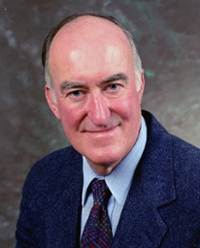

|

|
IN MEMORIAM
Howard A. Shugart
Professor Emeritus of Physics
UC Berkeley
1931 – 2016
Howard A. Shugart, professor emeritus of physics and a dedicated educator for more than 60 years, passed away on Monday, March 21, 2016. He was 84.
Born in Orange, California, on September 21, 1931, Shugart received his B.S. in physics in 1953 from the California Institute of Technology. He continued his studies in physics at the University of California, Berkeley, earning his M.A. in 1955 and his Ph.D. in 1957.
He joined Berkeley’s Department of Physics as a lecturer in 1957, becoming a full professor in 1959 and emeritus in 1993. From 1980 to 1987 he served as vice-chair of the department and was responsible for a complete reorganization of the advanced laboratory courses for physics majors. Colleagues cited him as among the first to recognize the valuable role computers could have within physics. He was dedicated to improving lower division and upper division laboratories through introduction of computers, new experiments and computer simulation modules to demonstrate physics principles.
In 1965, he was named group leader of the Lawrence Berkeley Laboratory Atomic Beams Group. Research interests included atomic and molecular beams, low energy nuclear physics, and the experimental determination of the mechanical and electromagnetic properties of nuclei and atoms.
In 1988, he became the second recipient of the Donald Sterling Noyce Prize for Excellence in Undergraduate Teaching. In 1993, he received the Berkeley Citation for his dedication to the department and the university, as well as his “impeccable integrity, courtesy and modesty, which is universally recognized and respected.”
He was a member of Tau Kappa Epsilon Fraternity, and resident and member of International House from 1953 to 1962. He was a fellow of the American Physical Society and the National Speleological Society and the author of more than 130 scientific papers. As an expert on atomic and molecular beams, he was selected to write on that subject for the Encyclopedia of Physics.
His passion for teaching extended to the greater Berkeley community as well through regular ‘Fun with Physics’ lectures and a demo lab on Cal Day, entitled ‘Why Should Students Have All the Fun?’ During one such presentation, he was asked when he knew he wanted to be a physicist. He responded that the pivotal moment came at the age of five when his father gave him a train set powered by a car battery (cables ran from the train through a window to the outside where they connected to the battery). He remarked that he learned about electricity by expanding his train set, adding batteries to accommodate its growth — finally leading to a model railroad set complete with a town and countryside. His curiosity about electric power grew, and he began talking with the lineman who worked in his neighborhood. He said by the time he was seven he knew and understood how the power grid for his entire city worked.
Professor Shugart remained actively involved with the UC Berkeley Department of Physics and Lawrence Berkeley National Laboratory until his death. He is survived by his wife of 44 years, Elizabeth (Betty) A. Shugart, who is retired from the nursing profession.
Steven E. Boggs
2016